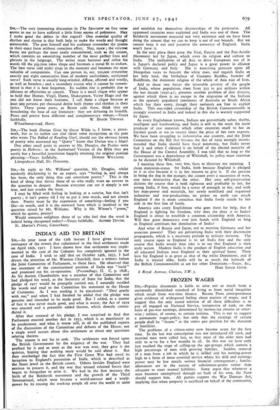SIR,—The very interesting discussion in The Spectator on free verse
seems to me to have suffered a little from excess of politeness. May I make good the defect in this regard? One essential quality of rhythm and rhyme is that both help to make the words and thought memorable. The poet himself and his audience remember ttte poems in their exact form without conscious effort. Nay, more ; the strictest forms are perhaps the most easily remembered, such as the sonnet, which contains an astonishing number of the most perfect lines and phrases in the language. The writer must hammer and refine his words till the pig-iron takes shape and becomes a metal fit to endure. The best verse (old style) sings in the memory and becomes the most valuable of companions. Can one person in, say, 500,000 remember exactly any eight consecutive lines of modern unrhythmic, unrhymed verse? Such verse is usually long-winded, diffuse, affected and woolly, as well as formless ; and a secondary reason why it cannot be remem- bered is that it is best forgotten. Its sudden rise is probably due to idleness or affectation or conceit. There is a small clique who appear to hold that Homer, Virgil, Dante, Shakespeare, Victor Hugo and the rest did not know their business. I call them a clique because at least 999 persons per thousand desire both rhyme and rhythm in their lyrics. These prose poets, as Byron calls them, think they are broadening the base of our literature: they are debasing its breadth. Prose and poetry have different and complementary virtues.—Yours






















 Previous page
Previous page